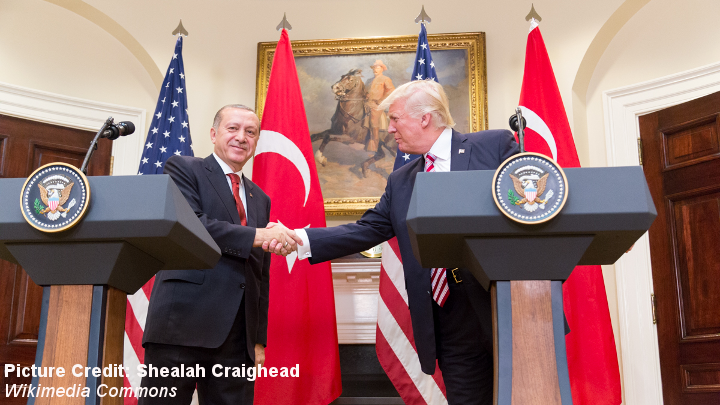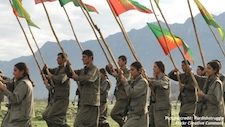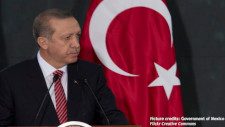A Road to Understanding in Syria?

Svante E. Cornell
Getting to better relations with Turkey will not be easy. But it’s far from impossible.
In early June, U.S. Secretary of State Mike Pompeo and Turkish Foreign Minister Mevlut Çavuşoğlu announced an agreement on a “roadmap” for the departure of Syrian Kurdish forces from the north Syrian town of Manbij. This agreement, which appears to call for joint U.S.-Turkish management of the area, ameliorates one of the major irritants in Turkish-American relations. Given the depth of disagreement and distrust between Washington and Ankara, it will not return the relationship to any real or imagined glory days. What it will do is help alleviate the compact sentiment in Turkey that the U.S. is conspiring against it. It makes it possible for the U.S. to begin to re-engage Turkey—which, perhaps counter-intuitively, may make it easier, not harder, to check some of President Recep Tayyip Erdoğan’s worst instincts.
This February, the Turkish-American relationship reached rock bottom. Turkish troops had moved into the town of Afrin in northern Syria, and threatened to carry their military mission into Manbij, where U.S. troops were located, supporting the very Syrian Kurdish forces that Turkey sought to dislodge from its border. A top U.S. general stated the U.S. would “respond aggressively” to any Turkish attack on Manbij. This led President Erdoğan to threaten its NATO ally with an “Ottoman slap.” The prospect of a direct military confrontation between the U.S. and Turkey, unthinkable only a few years ago, now seemed a distinct possibility. The situation was somewhat defused in mid-February by former Secretary of State Rex Tillerson’s diplomacy, which laid the groundwork for the “roadmap” announced by Pompeo.
The February standoff raised the very real prospect of a total breakdown in America’s alliance with Turkey. It has been long since the two sides behaved like allies. Only recently, President Erdoğan defined his country’s stance as “anti-imperialist,” while a mouthpiece for his government put the matter more succinctly: “Turkey is emerging as a new power center opposing the United States.” Given this attitude, some Americans might say “good riddance.” But the total loss of Turkey would be similar in strategic terms to America’s loss of Iran as an ally in 1979; it would further reduce America’s influence across the Middle East and beyond. This, no doubt, is what has led Moscow to work overtime to accelerate the breakdown of Turkish-American relations: in order to reap the benefits thereof.
What makes Turkey crucial is its geographic position: it lies at the confluence of the Balkans, the Black Sea, the Caucasus, Iran, the Middle East, and the Eastern Mediterranean. By definition, given the size of Turkey’s population, economy, and military, its stance is key to U.S. interests in all these theaters. Cooperation with it could amplify and reinforce U.S. goals; its opposition would make achieving these all the more difficult. The simple fact is there are no good alternatives to Turkey. The U.S. military base in Incirlik could conceivably be moved to facilities in Romania, Jordan, Georgia, and/or Iraqi Kurdistan; perhaps it should. But the U.S.-Turkish relationship is deeper than simply a matter of military bases, and no country, or combination of countries, could readily compensate for a loss of Turkey as an ally.
This is not to say that the U.S. should follow a policy of appeasement. Quite to the contrary: for far too long, the U.S. has operated under the assumption that it needs Turkey more than Turkey needs America—a notion that is true only if Washington allows that to be the case, and which ignores the immense leverage the U.S. has on Turkey in the military, security, and economic fields. Turkey’s slide into increasingly authoritarian and Islamist governance, and its pursuit of policies at odds with American interests across the Middle East, is a matter to be taken very seriously. Its hostility to America and its allies—particularly Israel—which Turkish leadership frequently exhibits, needs to be checked, and American leverage applied when needed. But America needs to play a long game in Turkey, looking beyond the current political leadership.
Whether or not anything beyond a tactical accommodation can be reached with Erdoğan’s government, it is in the U.S. interest to restore its relationship with Turkey as a country. This will not be easy: Turkey is more nationalistic than ever, and perceptions of the U.S. as a hostile actor are deeply engrained. But there is a key distinction: Turkey’s Islamists, Erdoğan included, are ideologically predisposed to see America as an enemy. Other political forces in the country, Turkish nationalists included, are not immune from anti-Americanism. Yet it is not hard-wired into their identity. Seeking a common language and common interests with Turkey’s Islamists is a lost cause and foolhardy at best; doing so with Turkish nationalists has worked in the past, and could work again.
In order to devise a policy along these lines, it is imperative to distinguish among the various problems in the bilateral relationship. While there are numerous contentious issues, the serious problems can be boiled down to three distinct sets of issues. In some of these, the controversy is between the U.S. and Turkey as a whole; in others, it is between the U.S. and Erdoğan’s government. In a long-term policy, the U.S. would accordingly need to apply different tactics. The first area of disagreement concerns Syria and the Kurds, issues that can hardly be distinguished from one another. The second area relates to the role of U.S.-based preacher Fethullah Gülen, whom Erdoğan accuses of staging a coup attempt in 2016. And finally, the third set of contentious issues stems from Erdoğan’s Islamism and anti-Western approach.
Syria
The controversy over Syria is, to Turkey, not primarily about Syria. It relates to Turkey’s own Kurdish problem, the most serious issue the country has faced since the republic’s creation in 1923, which in turn intersects with America’s engagements in the Middle East since the 1990 Gulf War. As detailed in a February 2018 article in TAI, Turkish and American interests in the Middle East began to diverge just as the Cold War ended. America’s interventions in Iraq, both in 1990 and 2003, had the effect of significantly worsening the threat posed by the Kurdistan Worker’s Party (PKK), an organization both the U.S. and EU classify as a terrorist organization. Matters are even worse in Syria: there, the U.S. directly cooperates with the People’s Protection Units (YPG), a militia force that the U.S. Director of National Intelligence describes as “the Syrian militia of the PKK.”
America’s approach to the Kurdish issue has been ambivalent. On one hand, the U.S. was once a strong supporter’s of Turkey’s efforts to counter the PKK, a murderous Marxist-Leninist organization built around the personality cult of its leader, Abdullah Öcalan. The U.S. played a key role in helping Turkey apprehend Öcalan in 1999, and used to put significant pressure on European states to crack down on PKK activities on their soil. But from 2003 onward, the U.S. came to view the Kurds of northern Iraq—themselves opponents of the PKK—as America’s most reliable allies there. This was not an insurmountable problem for Ankara, especially since Erdoğan himself embarked on an effort to court the leadership of Iraqi Kurdistan. In Syria, the logic of U.S. policy was similar to that in Iraq: the Syrian Kurds appeared to be the only reliable fighting force that could be used on the ground to confront ISIS.
The key difference was that the YPG was, as America acknowledges, a subsidiary of the PKK. Even this proved tolerable to Ankara because, as former U.S. Ambassador to Ankara and Baghdad James Jeffrey puts it, “We told the Turks that the Kurds were temporary, tactical, and transactional to defeat ISIS.” But once ISIS was on the ropes, the Pentagon this January doubled down on its relationship with the YPG and announced its intention to create a “Border Security Force” consisting mainly of YPG fighters.
This may have made sense to U.S. Central Command, which is preoccupied with the situation in Syria and Iraq, and in securing America’s role on the ground without having to commit thousands of troops that America’s domestic opinion would scarcely permit. And Centcom, in any case, has little love lost for Turkey: memories of the Turkish refusal to allow U.S. troops to open a northern front against Saddam Hussein in 2003 have not faded, and many senior U.S. officials continue to blame Ankara for some of what went wrong in Iraq. But this mixed messaging on Syria’s Kurds comes at a high price. Hatred for the PKK, whose campaign of terror has killed thousands since 1984, is near-universal in Turkey. The notion that America is in cahoots with a PKK subsidiary infuriates Turks of every political persuasion, with the possible exception of the pro-Kurdish HDP, itself not devoid of PKK linkages. And why would America set up a border force in Syria? To Turks, the only conclusion is that the U.S. is seeking to contain and undermine Turkey.
By inadvertently fueling such suspicions, the U.S. is effectively helping Erdoğan shore up support among otherwise skeptical Turks, who rally around the flag and leader against this perceived foreign threat. Pompeo’s roadmap begins to address this problem.
The Gülen Factor
Why, are so many Turks so suspicious of America? Part of the answer lies in Erdoğan’s promotion of conspiracy theories, which we will get to shortly. But an equally important reason is the Gülen factor. Since 1999, this reclusive preacher has resided in self-imposed exile in the Poconos mountains of Pennsylvania, from where he directs a large and opaque global network of schools and civic associations. His disciples have been focused on infiltrating the Turkish state since the 1970s, a fact that led Erdoğan to strike a tactical alliance with Gülen in the early days of his tenure, which helped him tremendously in consolidating power. Erdoğan fancies himself the embodiment of Turkey’s Sunni Muslims. Since Gülen, too, is a Sunni Muslim, Erdoğan assumed the Gülenists would remain loyal to him. But over time, it became clear that Gülenists were pursuing their own power and influence, and were not going to defer to Erdoğan. This led to an overt power struggle between the two—in effect, an Islamist civil war for control over the Turkish state. Not without reason, Erdoğan blames Gülen for orchestrating the July 2016 coup attempt which led to the death of over 200 people and to the bombing of the country’s parliament.
The notion that Gülen is a CIA creation has been widespread in Turkey for decades now. How else, Turks wonder, would such an obscure network be able to spread globally, so that it at one point operated schools in 160 countries? And why would an Islamist cleric choose the United States as his residence? Seeking to rebut such conspiracies is a fool’s errand. But again, these are not fringe beliefs among Turkey’s Islamists. They are held compactly across almost every political and social strata in Turkey. Thus, any sign that the U.S. is protecting Gülen serves the purpose of shoring up support for Erdoğan. Particularly following the failed 2016 coup, even die-hard secularist opponents of Erdoğan have rallied to his support, with a simple logic: Erdoğan is the only person who has the strength and force to root out the Gülenists from Turkey’s state institutions, and make sure they could never again get close to power.
Does this mean the U.S. should simply hand Gülen over to Erdoğan and close down all his activities in America? The U.S. is a nation of laws, and Gülen a Permanent Resident of the United States. Leaving aside the question whether Gülen could be expected to receive a fair trial in Turkey—a doubtful proposition at best—Turkey’s extradition request does not appear to have provided enough evidence to tie Gülen to the coup attempt or any other criminal offenses. Erdoğan’s government considers the Gülen Network a terrorist organization, and applies collective punishment to everyone it considers part of the network, and would like the U.S. and Europe to do the same. But as EU Counter-Terrorism Coordinator Gilles de Kerchove noted, “You need not only circumstantial evidence . . . but concrete substantive data which shows that they were involved.” Similarly, the U.S. cannot take legal action unless evidence shows the individual involvement of a particular person in coup planning.
Circumstantial evidence can, however, lead the U.S. to re-evaluate its approach to the Gülen network. It does have redeeming qualities—few Islamic clerics have taken out full-page ads to condemn ISIS and jihadi terrorism, for example. But given the amount of evidence linking the network to the coup, and its involvement in the jailing of secularist Turks on fraudulent grounds, this network can hardly be considered an asset to U.S. interests. Not staying at that, there are serious allegations that the many Gülen-affiliated charter schools in the United States have engaged in systematic fraud that is under FBI investigation.
Any sign that the U.S. is taking accusations against the Gülen network seriously, and investigating its activities in the United States, would go a long way toward managing the widespread perception that the U.S. is protecting what most Turks consider a terrorist organization. That, in turn, would play an important role in rebuilding trust for the United States in Turkish society—and rob Erdoğan of a tool to whip up anti-American hatred.
Islamism
The final, and deepest, bone of contention between the U.S. and Turkey is the increasingly Islamist direction of President Erdoğan’s tenure. Erdoğan started out as a politician who parted with the Islamism of his predecessors, even setting up a new party that split off from the old-school Islamists of the past. But as he consolidated power, he gradually returned to the Islamist rhetoric of his youth, and adopted an increasingly autocratic approach to ruling the country. By necessity, U.S. foreign policy must deal with autocrats everywhere; but in Turkey’s case, the authoritarian tendency has been coupled with a growing anti-American posture in Turkish foreign policy, coupled with a decidedly anti-Zionist, and frequently anti-Semitic rhetoric and approach to Middle Eastern affairs.
Erdoğan’s tendencies were visible already in the early days of his tenure, as he embraced Hamas following its power grab in 2006. No wonder: Turkey’s Islamist movement, from which Erdoğan stems, is heavily colored by the ideology of the Muslim Brotherhood, of which Hamas is a branch. After the Arab upheavals of 2011, Turkey increasingly adopted an ideological, sectarian foreign policy that sought to assist the Muslim Brotherhood, and other Islamist organizations, in securing power across the Middle East and North Africa. This put Turkey directly at odds with U.S. interests, as it egged on Muhammad Morsi in his ill-fated attempt to grab power through unconstitutional means in Egypt, and supported extremist groups in the Syrian civil war. Of even more concern, perhaps, has been Ankara’s naked hostility to the State of Israel, and Erdoğan’s recurrent promotion of anti-Semitic conspiracy theories, also a legacy of the ideological environment that formed him as a politician. In recent months, Erdoğan has even lashed out atthe reforms being carried out in Saudi Arabia, decrying the very notion of “moderate” Islam, while his party’s mouthpiece drums up conspiracy theories of American attempts to rob Muslims of their hold on the holy sites of Mecca and Medina.
Syria and Gülen are important issues, but they are just that—concrete issues where state interests may diverge, and where it is possible, through diplomacy and other means of statecraft, to overcome differences. By contrast, Erdoğan’s ideology is a much deeper impediment, an existential challenge to the Turkish-American alliance. If this ideology becomes hegemonic in Turkey, the alliance is doomed.
Happily, this is not destined to happen. Erdoğan has, without doubt, made Turkish public opinion more anti-Western and anti-Semitic than it was before he assumed power. But the societal resistance to Erdoğan’s Islamization efforts is remarkable, not least in the field of education, as Turkish parents stubbornly refuse to send their children to the underperforming religious schools that Erdoğan’s education ministry favors. Erdoğan also finds it increasingly difficult to obtain the support of more than just shy of half of the population. In spite of his control of administrative resources, superior funding, and near-saturation level of supportive media coverage, it is a testament to society’s resistance that in the current election campaign, his victory is not a foregone conclusion. The main opposition candidate, Muharrem Ince, could well win a second round, if the election is conducted fairly—a big if.
Indeed, within the Turkish state—whose institutions have begun to reassert their influence, particularly over foreign policy—there is considerable reluctance to embrace Erdoğan’s Islamist ideology. In other words, both within state and society, Erdoğan’s ideology is polarizing, in sharp contrast to society’s strong support for his stance on Syria and on the Gülen movement.
This has obvious implications for the United States. First, the U.S. should take Turkey’s interests on Syria and on the Gülen issue into account. This does not mean meeting every Turkish demand. But it does mean seeking accommodation on these issues, where Erdoğan enjoys the support of a near-consensus of Turkey. By contrast, on issues where his position is most polarizing—which happens to be the issues that in the long term will matter most to the United States—that is where the U.S. should push back assertively.
Meanwhile, the U.S. has to do a much better job at reaching beyond Erdoğan, and finding ways to talk to other actors and institutions in Turkish society. The Roadmap in Syria provides such an opportunity: it could help Centcom develop relations with Turkey’s military, as European Command has done for decades. This won’t be easy at first, but could prove crucial in the long term. The U.S. must also reach out to nationalist political parties and organizations in Turkey, which all too often get swept up in anti-American rhetoric—which Americans have hardly tried to mitigate.
But just as Syria was the most acute crisis that threatened a direct confrontation between Turkey and the U.S., it is also in Syria that the restoration of a relationship with Turkey, and of American influence in the country, could begin. This will only succeed if the Trump Administration takes a long-term and strategic approach that centers on Turkey, the country, as opposed to Erdoğan, the person. Pompeo’s roadmap could be the start of such an approach.
This article was originally published at The American Interest. Find it here.




